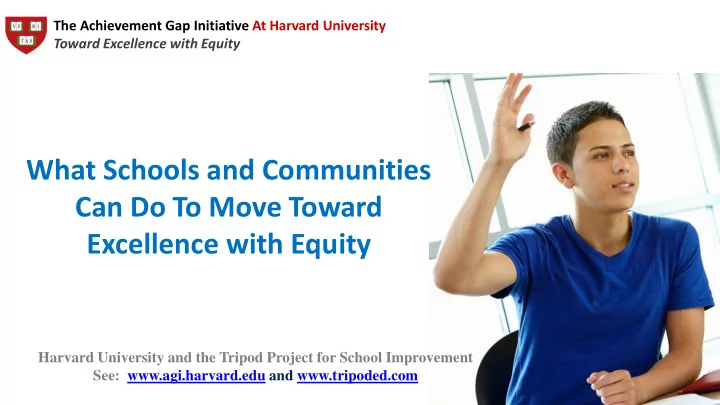

The Achievement Gap Initiative At Harvard University Toward Excellence with Equity What Schools and Communities Can Do To Move Toward Excellence with Equity Harvard University and the Tripod Project for School Improvement See: www.agi.harvard.edu and www.tripoded.com
Sure as Sunlight There is a child here in your caring who may someday cure all cancer but you’ve got to lay the groundwork so that it can come to pass. She is a child who has not blossomed so you cannot see her brilliance but as sure as there is sunlight she is here now in your class. I cannot tell you what her name is Latent potential nor her height, nor weight, nor color, waiting to only that she is potentially be harvested. a history-making lass.
TESTED OUTCOMES AGENCY-RELATED FACTORS Reading Skills Growth Mindset Math Skills Conscientiousness Reasoning Skills Future Orientation Academic Knowledge Persistence SCHOOL AND LIFE SUCCESS
ALL AGES AND STAGES ARE IMPORTANT!
Birth to 3: 80% of brain development!
Ages 3 to 5: pre-school socialization and school-readiness skills
Ages 5 to 9: school socialization, learning to read and do basic arithmetic
Ages 9 to 14: reading to learn; trying on identities and imagining possible future selves
14 to 18 : settling on an academic and pre- career pathway
18 to 22: transitioning from adolescence into the adult world
22 to 30: finding a career track, adult routines and separating from parents
KEY ROLES: Parents Parents/Family Teachers Teachers/School Community (PreK-18) Peers Employers Peers Employers Community
One Conception of the Goal: Excellence with Group Proportional Equality
Achievement distribution for group A Achievement distribution for group B Excellence with Equity => A and B have the same high distribution.
The Importance of Early Childhood
U.S. Cognitive Gaps in Early Childhood (As a percentage of scores for white females) Males Females MALES FEMALES Native Native White Black Hispanic American White Black Hispanic American 0.00 -5.00 At 1 Year Old -10.00 At 2 Years Old -15.00 -20.00 Source: AGI Calculations using Bailey Test score data from the U.S. -25.00 national Early Childhood Longitudinal Study, Birth Cohort.
Many children fall behind early and never catch up. Cognitive Skills Average racial and ethnic gaps equal 3 to 4 years of learning by age 17* Age 17 0 1 2 3 4 5 *This refers to the gap between blacks, Latinos, and Native Americans, compared to whites, on the National Assessment of Educational Progress.
Our aspiration: Cognitive Skills One higher curve for all groups Age 17 0 1 2 3 4 5
Saturate the community with parenting information & supports. Make life the program! Help families experience positive reinforcements from every direction for doing the things that matter.
Boston Basics Videos
Socio-Ecological Saturation Health Centers & Pediatricians Hospitals Retail Shopping Barbers, & Beauticians Housing Faith Based Developments Organizations Schools, Child Care Settings Museums, & Libraries Community Centers
For school-aged children: We need to teach ways that develop not only academic skills and knowledge, but also agency .
Agency is the capacity and propensity to take purposeful initiative. The opposite of helplessness.
TEN GUIDELINES FOR TEACHING TO CULTIVATE AGENCY
Care B e attentive and sensitive, but avoid a tendency among sensitive teachers to coddle students in ways that hold them to lower standards and undermine their agency.
Confer E ncourage and respect students’ perspectives and honor student voice, but also stay focused on instructional goals; avoid extended discussions that have no apparent purpose and thereby fail to model self-discipline and effective agency.
Captivate S trive to make lessons stimulating and relevant to the development of agency. If some students seem unresponsive, do not assume they are disinterested. Some students — and especially those who struggle — purposefully hide their interest and their effort.
Consolidate Regularly summarize and check for understanding, because consolidation helps to solidify learning and models your agency as a teacher, even when students seem reticent or disinterested.
Clarify Clarify by clearing up confusion: take regular steps to detect and respond to confusion in class, but in ways that share responsibility with students for doing the thinking. Clarify with lucid explanations: strive to develop clear explanations — especially for the material that students find most difficult — including lucid examples of how the skills and knowledge you teach can support effective agency. Clarify with instructive feedback: give instructive feedback to help scaffold student agency in correcting their own work and building their own understandings.
Challenge Challenge by requiring rigor: press students to think deeply instead of superficially about their lessons; set and enforce performance goals that require students to use reasoning and exercise agency. Challenge by requiring persistence: consistently require students to keep trying even when work is difficult — to give their best efforts and produce their best work — knowing that few things could be more important for developing agency.
Classroom Management S trive to achieve respectful, orderly, on-task student behavior in your class by teaching in ways that clarify, captivate, and challenge — in support of agency — instead of imposing control by intimidation and coercion.
-- How important do you think agency is compared to the knowledge and skills that standardized tests measure? -- Should both agency and academic skills be promoted as essential outcomes? -- How are agency and academic outcomes interrelated ?
Recommend
More recommend